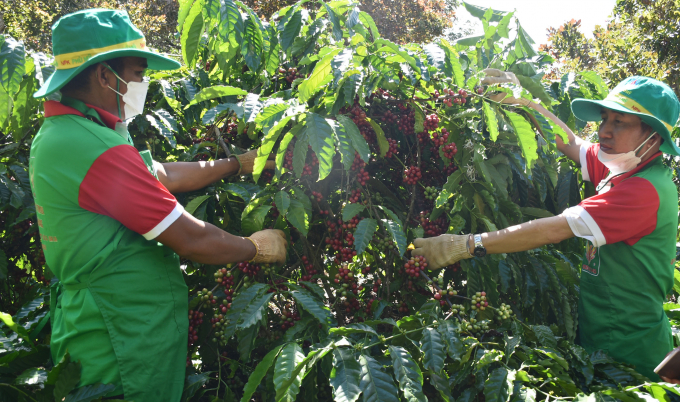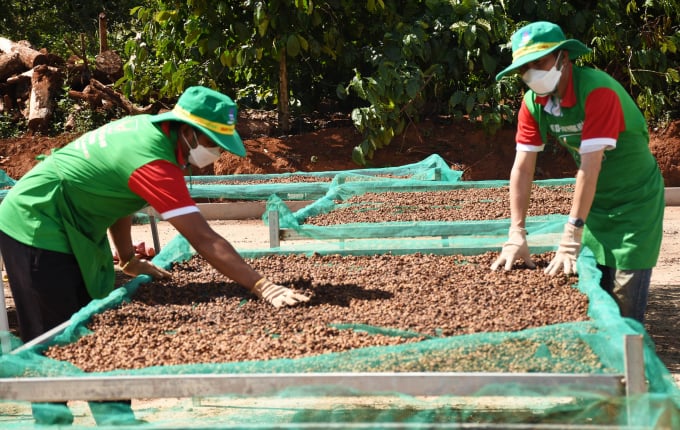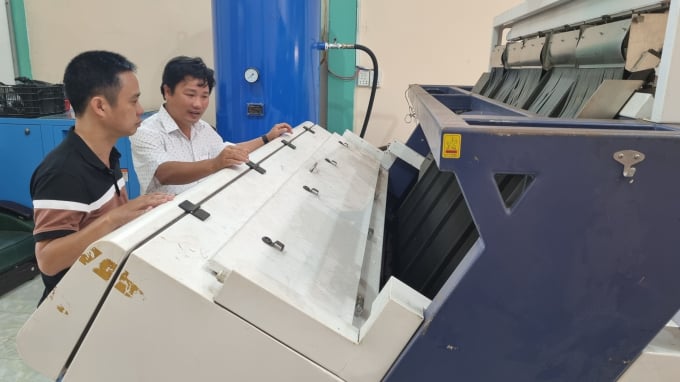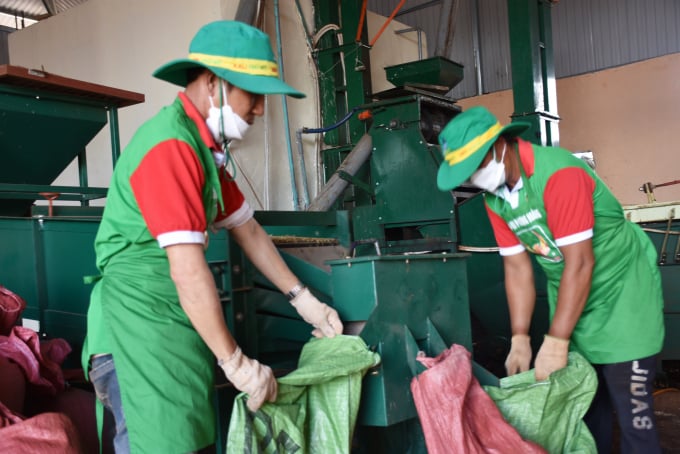November 27, 2025 | 21:05 GMT +7
November 27, 2025 | 21:05 GMT +7
Hotline: 0913.378.918
November 27, 2025 | 21:05 GMT +7
Hotline: 0913.378.918

Through the association, Phuong Hoang Cooperative has created a model of sustainable coffee development. Photo: Tuan Anh.
In recent years, people in Duc Co district (Gia Lai province) have mainly focused on two main raw materials, which are rubber and coffee. However, the production form is often small-scale. Because there is no production linkage, the price has been forced by traders, sometimes the product cannot be sold.
Mr. Nguyen Tan Duy, Director of Phuong Hoang Construction - Trade and Service Cooperative ('Phuong Hoang Cooperative') was determined to mobilize households with large coffee areas to join together to form a cooperative model for sustainable coffee development.
By July 2018, the cooperative was officially established but only operated on a small scale in Ia Nan commune (Duc Co district) with a small number of participants.
Then, Mr. Duy noticed, most people in Duc Co district wanted to join together, but no cooperative has come forward to do this. Therefore, Mr. Duy strongly set up an advisory council to call on retired officials to participate in helping the cooperative development.
After more than a year of the association, the cooperative was approved by the People's Committee of Duc Co district to provide funding to support people. This is the basis to help cooperatives link households together, thereby reducing input costs and increasing output production value.

Phuong Hoang Cooperative focuses on deep processing. Photo: Tuan Anh.
By now, Phuong Hoang Cooperative has 324 members, with a coffee-growing area of 530 hectares. In addition, the cooperative also established cooperative groups in villages and hamlets to promote the coffee industry for sustainable development.
“The cooperative has supported people with quality fertilizer materials at reasonable prices so that people can benefit the most. In addition, the cooperative focuses on deep processing to enhance the coffee value,” shared Mr. Duy.
This approach has received a great response from the Department of Agriculture and Rural Development of Gia Lai province and especially the VnSAT project, which then stepped in to support the cooperative to promote sustainable coffee development.
In addition to supporting all members in training on sustainable production and replanting, the VnSAT project also supports cooperatives to invest in an economical irrigation system to reduce investment costs and improve coffee quality.
Not stopping, to develop coffee along a sustainable value chain, the VnSAT project continues to invest in coffee processing equipment and machinery such as color separators (VND 1.6 billion), wet-processed fresh coffee peeling machines (VND 2.8 billion).

The coffee color sorter system is supported by the VnSAT project. Photo: Tuan Anh.
In addition, the cooperative is also invested in 2 routes to facilitate transportation to the production area. Specifically, the inter-commune route Ia Krieng - Ia Kel has a length of 5.2 kilometers with a total cost of VND 10.6 billion; and the route from Ia Lang commune to Chu Ty town has a length of 6 kilometers with a total cost of VND 15 billion.
In the next period, the VnSAT project will continue to invest in the cooperative system of drying yards and screens with a total area of 6,000 m2 and an estimated cost of VND 4.6 billion; The automatic warehouse holds 500 tonnes with an estimated cost of VND 7.8 billion.
In the past 2 years, due to the impact of the Covid-19 pandemic, the coffee industry has faced many difficulties. With support from VnSAT, Phuong Hoang Cooperative has focused on investing in more infrastructure and machinery for deep processing to create high-value products.
"Hopefully in the upcoming time, departments and sectors will support cooperatives to link up to put coffee products into supermarket systems, connect for export to create a more stable consumption market," Mr. Duy expressed.

Phuong Hoang Cooperative will focus on the export market. Photo: Tuan Anh.
Mr. Le Quoc Tuan, Deputy Director of the VnSAT Project Management Board in Gia Lai province, said that Phuong Hoang Cooperative is one of the most effective units in linking value chains with farmers to develop sustainable coffee. Cooperatives are also very successful units when associated with export enterprises to consume products for the people.
In the beginning time, the VnSAT project supported the cooperative to invest in an economical irrigation system, train on sustainable coffee production, and replanting.
In the coming time, the Project will continue to support equipment and machinery and invest in infrastructure to improve sustainable coffee farming and harvesting.
The Ministry of Agriculture and Rural Development has had a pilot project on sustainable coffee production, creating material areas for the two provinces of Dak Lak and Gia Lai so that the cooperatives can continue to improve.
“If you want quality coffee for export, you need to link coffee-growing areas together. The cooperative has also planned a project to develop coffee in the border area. To do so, it is necessary to link between the districts of Duc Co, Ia Grai, and Chu Prong.
The cooperative has now worked with some large coffee-producing households in Ia Grai and Chu Prong districts to establish branches. The members have agreed to join forces to build a sustainable coffee value chain," emphasized Mr. Nguyen Tan Duy.
Translated by Ha Phuc

(VAN) According to Mr. Vo Minh Thanh, Director of the Tay Ninh Department of Agriculture and Environment, Resolution 57 has created a new development pathway for the locality, shifting from traditional toward modern agriculture.
/2025/11/26/4909-2-154329_878.jpg)
(VAN) Pearl grouper farming in HDPE cages not only delivers economic efficiency but also contributes to protecting the environment, creating jobs, and promoting marine-based experiential tourism.

(VAN) The model of making a living under the forest canopy through the agroforestry system in Van Son commune, Bac Ninh province, is expected to generate an annual income of approximately VND 30 million/ha.

(VAN) Many enterprises in Can Tho are harnessing natural energy and reducing greenhouse gas emissions in their production processes, thereby contributing to the promotion of a sustainable green transition.
/2025/11/24/3536-2-112800_176.jpg)
(VAN) Dong Nai now has tens of thousands of hectares of forests certified for sustainable management, and this area will continue to be expanded in the coming period.

(VAN) Vinh Ha hamlet (Dai Xuyen commune, Hanoi) is shifting away from small-scale farming as households adopt bioscurity into their breeder chicken models.

(VAN) Heavy rains make aquatic species more vulnerable to disease. Proactive water management and high-tech systems help farmers prevent outbreaks and protect yields.